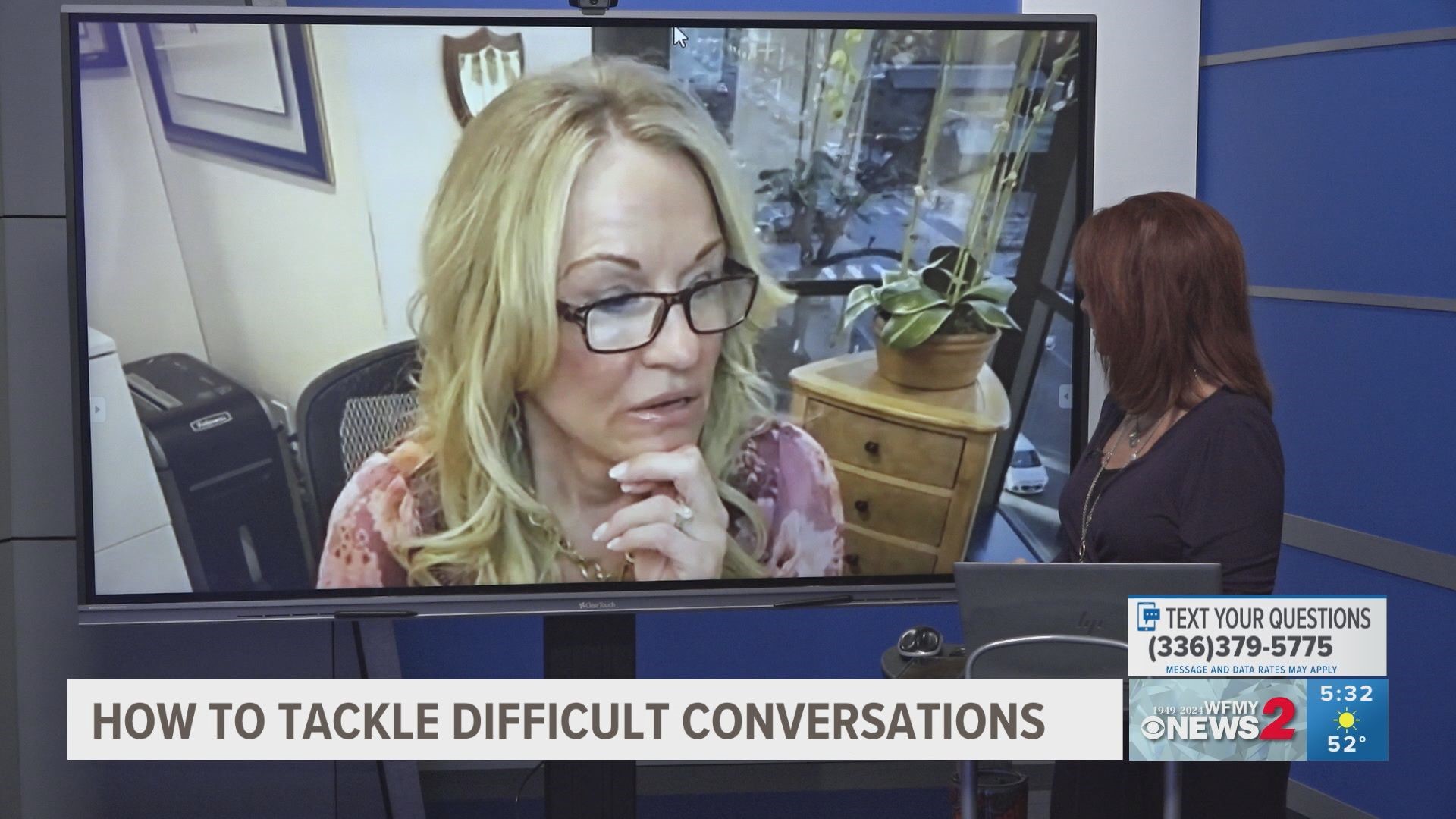GREENSBORO, N.C. — Difficult conversations can be tough to tackle. Whether they are with family, friends, or co-workers, it can be hard to find the right approach when starting these talks. Etiquette expert Sharon Schweitzer gives the following tips and advice when it comes to difficult and awkward conversations.
Before starting the conversation, engage in self-reflection by asking yourself:
- What is my goal or purpose for the conversation? What do I hope to accomplish? What is an ideal outcome?
Consider hidden agendas. Do I have honorable goals? Educating a spouse, family member, or friends; or improving communication with your teenager. Be cognizant of excessively critical or condescending language. Base the conversation on a supportive purpose. - Am I making assumptions about other’s intentions? If I am experiencing intimidation, belittlement, disrespect, or marginalization – is that what my spouse's intention is? Impact does not necessarily equal intent.
- Are my “hot buttons” triggered? Am I overly emotional or responding disproportionately to the situation? Does my personal history impact the situation?
- What is my perception of how the conversation will unfold? Avoid a self-fulfilling prophecy. Think positively and seek maximum effectiveness.
- How is the other person analyzing the situation? Is it a challenge for them? What are their needs and fears? What solution might they suggest? Reframe them as partners.
- What are my fears and needs? Any common ground?
- How have I contributed to the conflict? How has the other person?
4 Keys to a Successful Outcome
The lion’s share of the work in any conflict conversation is work self-reflection, even if the conversation begins smoothly. Regardless of how well the dialogue starts, remain calm.
#1: Inquire
Cultivate an attitude of discovery and curiosity. Work from a position of ignorance and attempt to learn new information. “Educate me please” is a powerful phrase. Observe body language and listen for tone. What do they truly seek? What is unsaid? Allow them to talk until they are finished. Avoid interrupting – but do acknowledge their statements. Avoid taking their comments personally. Most times it is not about you.
#2: Acknowledge
Demonstrate that you have listened and understood. Put yourself in their position so that you can make the argument for them. Then proceed to restate their comments. Show them that you see their position. Acknowledge facts, including personal defensiveness if needed. Acknowledgment may be difficult if assume it translates to agreement. Separate the two by saying something like, “This is clearly crucial for you,” which does not mean I agree with your solution.
#3: Advocate
When it is your turn, ask yourself what can I see from my perspective that they overlooked? Seek to clarify your position without minimizing their view. One approach is: “Based on your comments, I can see how you believe my response was abrupt. I was driving in heavy traffic and my phone battery was dying. I was attempting to tell you I changed the locks before we were disconnected. I did not mean to be rude, though perhaps I sounded rude. We were burgled last night, and the police officers recommended new locks. This provides more perspective.”
#4: Problem-Solve
Build solutions. Brainstorm. Inquire. What do they propose as a solution? Regardless of their response, find common ground and begin building. If things turn adversarial, return to inquiry. Seeking a different point of view can provide safety and encourage dialogue. If you successfully self-reflect, remain calm, adjust for a positive attitude, and engage in dialogue, creating a mutually beneficial solution is possible.
Etiquette Tips and Suggestions
- A successful outcome hinges on the emotional state and statements made. Our feelings and sense of being (calm, prepared, supportive, curious, solution-oriented) directly impact our comments.
- Acknowledge your and their emotions; focus on common ground.
- Remember and return to the goal when things turn challenging.
- Avoid taking verbal attacks personally. Encourage them to focus.
- Avoid assuming others view things from your perspective.
- Engage in a practice conversation with a friend beforehand; include the most difficult aspects.
- Intellectually analyze the conversation. Consider different possibilities and visualize a calm response to tough questions. Focus on the goal.
How to Begin? Consider these conversation starters:
- I would like to have a discussion with you that will hopefully help us communicate better as a couple.
- May we talk about our teenagers? Let’s explore ideas about how to _____.
- I suspect we have different opinions about _________. Will you share your thoughts?
- How might we find common ground about ___________? I would appreciate your thoughts and would like to share mine as well.
- I have sensed a recurring ___________ (challenge, conflict) we are experiencing. May we discuss how that happens?
- I would like to talk about what I observed recently. I am curious about your perspective.
- It is important that we talk about _______, however; first I would like to listen to your viewpoint.
- Will you help me understand what just occurred? Do you have time?
- I need your insight into a situation. How soon can we talk about it? If they defer, follow up.
Schweitzer gives this last piece of advice: It may be helpful to write down potential conversation starters tailored to your situation. Think through the major points you wish to share.

